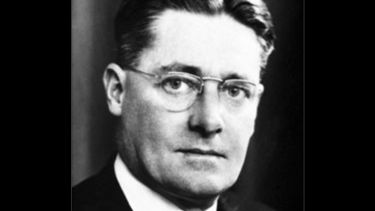The first documented use of penicillin as a therapy - carried out at the University of Sheffield - has today (6 December 2018) been named as one of the UK’s 100 best breakthroughs in recognition of the impact the research has had on everyday life.
It’s commonly known that Alexander Fleming discovered penicillin in 1928. However, what is perhaps not as well-known is the research conducted by scientists at the University of Sheffield into the drug which has gone on to save more than 82 million lives worldwide.
In 1930 the first documented use of penicillin as a therapy was carried out in Sheffield by Cecil George Paine, a member of the University’s Pathology Department. He treated an eye infection in two babies with a crude filtrate from a penicillin-producing mould supplied by his lecturer, Alexander Fleming, whilst studying at St Mary’s Hospital Medical School in London.
Fleming had published details of his fundamental discovery of penicillin as an antibacterial agent in 1929, but its therapeutic potential had not been pursued. Paine however mention his findings to Fleming and Howard Florey – the Professor of Pathology at Sheffield Medical School (1932-35).
Along with a team from Oxford, Sir Howard Florey went on to purify penicillin – conducting the first clinical trial of the drug in 1941.
Now, over 75 years later and inspired by Howard Florey’s pioneering work, the University of Sheffield’s Florey Institute is addressing one of the world’s biggest biomedical challenges – infectious disease.
Set within the context of emerging antibiotic resistance, Florey scientists study the complex interaction between pathogens and their host. By working together with collaborative partners, Florey is bridging the gap between science and patient care to tackle the global threat to human healthcare.
Professor Simon Foster, Florey Coordinator at the University of Sheffield, said: “We are taking an interdisciplinary approach to understand how infectious organisms cause disease, from the fundamental to translational levels. It is by the close interaction between basic scientists and clinicians that new discoveries can be applied to give novel interventions with positive outcomes for human healthcare.
“We are revealing the mechanisms that underpin growth and division of pathogenic bacteria and using this new information to inform the use of existing antibiotics and aiding the design of novel therapies.”
Professor Dave Petley, Vice-President for Research and Innovation at the University of Sheffield, said: "Our research at the University of Sheffield has a global reputation - helping us to better understand the world, and so influencing policy and changing lives.
"One of the most important examples of this is Howard Florey's contribution to the use of penicillin as a therapy - a drug that has gone on to save millions of lives worldwide.
“We are exceptionally proud that Florey's work has a lasting legacy and continues to inspire research here at the University of Sheffield that is addressing one of the world's biggest challenges - antibiotic resistance."
The list of the UK’s Best Breakthroughs, published today (6 December 2018) demonstrates how UK institutions like the University of Sheffield are at the forefront of some of the world’s most important discoveries, innovations and social initiatives. These include the discovery of penicillin, work tackling plastic pollution, ultrasound scans to check the health of unborn babies and the establishment of the Living Wage.
The list also highlights the less celebrated but vital breakthroughs that transform lives, including a specially-designed bra to help women undergoing radiotherapy; a toilet that flushes human waste without the need for water; the development of a new scrum technique to make rugby safer; a sports initiative that aims to use football to resolve conflict in divided communities; and even work to protect the quality of the chocolate we eat.
The list was compiled by Universities UK, the umbrella group for UK universities, as part of the #MadeAtUni campaign to change public perceptions of universities and bring to life the difference they make to people, lives and communities across the UK.
It follows independent research undertaken by Britain Thinks, which found that the public has little understanding of the benefits of universities beyond undergraduate teaching. The findings show that research is one of the key triggers to change opinion about universities but for many people, it is an abstract concept.
Professor Dame Janet Beer, President of Universities UK, said: “Universities really do transform lives. The technology we use every day, the medicines that save lives, the teachers who inspire – all come from UK universities and the important work being done by academics.
“The UK’s Best Breakthroughs list is a testament to the difference that universities make to people’s lives and we want everyone to join us in celebrating the work they do.”

